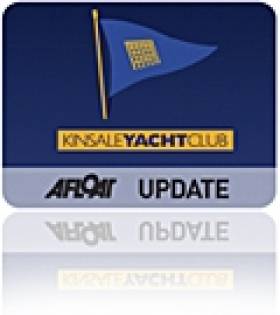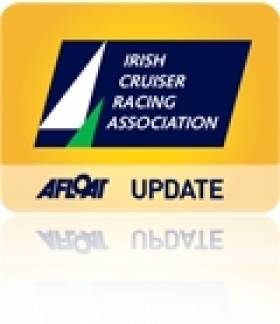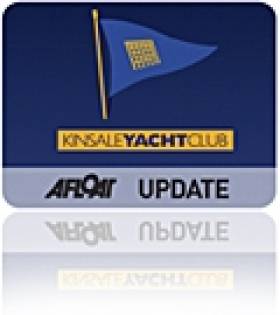Displaying items by tag: Sovereign
Winners Get Just Rewards at Kinsale's Sovereign's Cup
Some of last weeks ICRA Nationals were unseated in Kinsale yesterday when visiting boats beat Cork crews took fine wins at a blustery 2011 Sovereign's Cup.
Anthony O'Leary lifted the Sovereign's Cup trophy for the third time. He first won it in a 1720 sportsboat in 1996 on Ford Racing.
David Scott's EOS won the Portcullis trophy for the most consistent performance on ECHO handicap.
UK visitor Xpletive (Mike Crompton) was the winner of the inaugural Michelle Dunne Prix D'elegance trophy. The presentation of the award was made by Michelle's sister, Carrie Dunne. (See photos below)
The overall results show that Kinsale Yacht Club's staging of the Sovereign's Cup was one of the most demanding editions of the cup to date. One hundred cruisers participated in the four day regatta that experienced a wide range of conditions and ended yesterday in mist and fog, reducing visibilty down to 500 metres. Scroll down for selected results and prizegiving photography from Bob Bateman.
As widely predicted Anthony O'Leary's Antix prevailed in Class Zero with a winning marging of nine points over club-mate Jump Juice (Conor Phelan). Third place completed the Royal Cork wrap up of the 10-strong big boat class with Kieran Twomey's Corby 38 Glove's Off on 23 points.
In Class One David Scott's EOS maintained an early lead in his X 362 Sport to beat a trio of J109 designs.
11 points separated the local winner from Royal Cork's Jelly Baby (Ian Nagle). Former Royal Irish Commodore Peter Redden was third on Jetstream.
After a many successful years racing on the Shannon Estuary and West Coast, including winning WIORA in 2005, David Scott moved EOS to Kinsale to get more competition. With a composite Limerick/Kinsale crew, they have competed over the last five years in all major sailing events on the South Coast.
In class two, the vintage Dublin based Sigma 33 White Mischief, skippered by Tim Goodbody, completed a two week sailing odyssey firstly by retaining the national title on Belfast Lough on June 18. Her crew then embarked on a 48 hour trip south to win their class in the Sovereign's Cup, a remarkable achievement, given the recently crowned ICRA Class II champion, Allure (Brian Goggin, Kinsale) managed only fourth in class. Second overall was Yanks and Francs and third, Ian Byrne's Sunburn from Howth.
In class three, visiting Rob Gray's Aquila overhauled the impressive Tiger by three points. The Royal Cork champion lost out when Gray scored wins in the last two rounds.
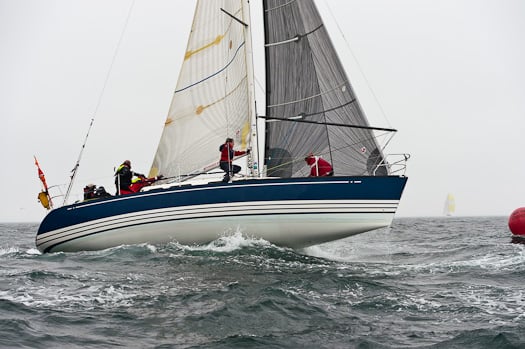
Big seas for Exhale in Class One. Photo: Bob Bateman
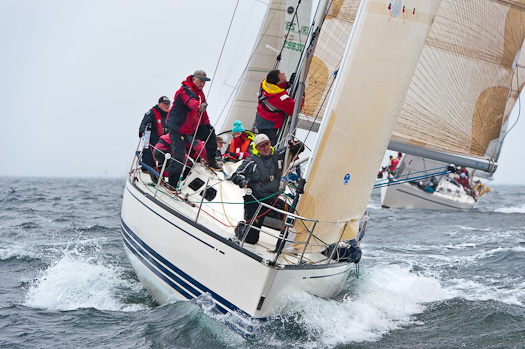
Portcullis Trophy winner EOS from Limerick prepares for a hoist. Photo: Bob Bateman
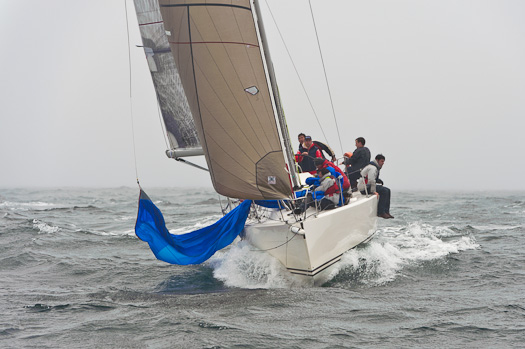
The J109 Jelly baby retrieves her Spinnnaker. Photo: Bob Bateman
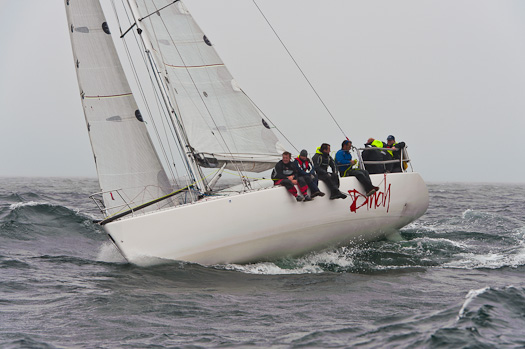
Barry Hurley's Dinah. Photo: Bob Bateman
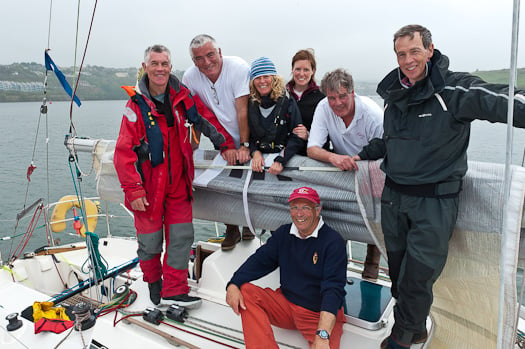
Round Ireland winners; last week Belfast lough, this week Kinsale. Tim Goodbody celebrates with his crew. Photo: Bob Bateman
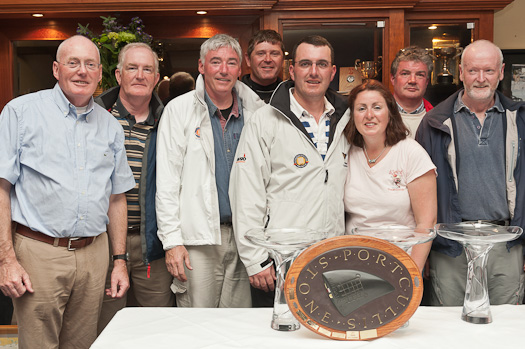
The EOS Crew with the Portcullis Trophy
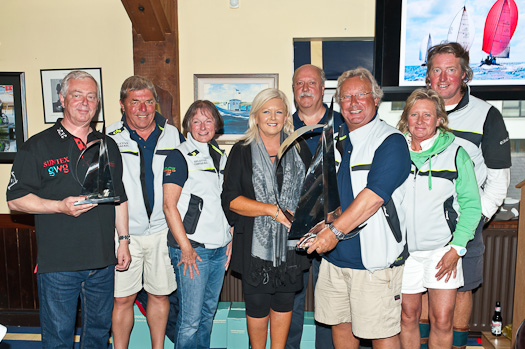
Xpletive (Mike Crompton) the winner of the inaugural Michelle Dunne Prix D'elegance trophy. The presentation was made by Carrie Dunne, sister of the late Michelle and was a very emotional moment for all present with the thunderous applause echoing this sentiment.
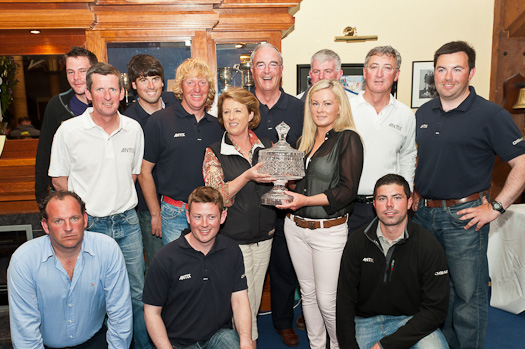
The Antix crew lift the Sovereign's Cup for the third time. Our Picture shows Sally O'Leary and Aoife English, crew member and daughter of well known sailor Joe English, proudly displaying the magnificent trophy surrounded by the Antix Team.
Photo: Bob Bateman
Southern Correspondent Claire Bateman adds:
Had to believe it's all over. On the last scheduled day of sailing the forecast was for a clearance to sunny spells and warm weather and while that happened in Cork and surrounds, it certainly did not happen in Kinsale where the fog and mist produced miserable conditions. Winds were 15 kts where the quarter tonners were sailing and out at the Sovereigns were 15 to 18kts or more. The day was not without its moments as crew member Frances Lynch from Jump the Gun went for an involuntary swim off the side and was plucked from the water by Martin Darrer's True Pennance racing in the immediate vicinity. The J109 Jedi had a handling error with the spinnaker and they ended up doing a bit of trawling while Crazy Horse had a broach that resulted in a torn spinnaker.However, this was the day for results and every boat in the fleet was out to perform to their highest ability. Some were going out knowing they were not in with a chance to win but nonetheless might improve their placing, others were going in the knowledge this might be their lucky day if things were to go their way but for sure nobody knew for certain was was going to happen in the fiercly fought Quarter Ton class. In the end it was to be a most decisive two bullets on the day that secured the trophy for the popular visiting boat, Rob Gray's Aguila. However, the full results are documented and are worth having a good look at to see how close the competition was in the different classes and how all the various good fights were won and lost.
The prize giving was most eagerly awaited and the mist shrouded club and grey evening did nothing to dampen the enthusiasm of the patiently waiting competitors and helpers. After all, who was to going to be awarded the Michelle Dunne Prix d'Elegance, The Sovereign's Cup or Portcullis Stone (known as trophy). Incidentally, on studying this beautiful piece of work it is actually titled Portcullis Stone. Secretly, every skipper present was hoping to be the lucky recipient of one or other.
At last the moment arrived and when presentations of the class trophies had been completed by Ross O'Leary of MGM Boats, John Stallard representing Eli Lilly and Club Commodore Alice Kingston, it was time for the big one.
The Michelle Dunne Prix d'Elegance trophy was awarded to British visitor Mike Crompton in Xpletive and was presented by the Late Michelle's sister, Carrie, on behalf of the Dunne family. The Port Cullis Stone for the best perceived performance in ECHO was awarded to David Scott's EOS and the Sovereign's Cup for the best performance in IRC was awarded to Anthony O'Leary's Antix. These three awards are decided on by a Regatta Committee decision.
The bemused British visitors on Xpletive were not fully aufait with the significance of the Prix d'Elegance Trophy. Anthony O'Leary in his acceptance speech for the Sovereign's Cup paid a very fitting tribute to Michelle and when Xpletive crew members became fully aware of the story behind the Prix d'Elegance they were visibly moved and thrilled to have been selected.
Now it is time to move on. The visitors are getting ready to pack up and leave, Peter O'Leary has left since Friday to travel to Fuerteventura for fitness training in his Olympic programme in the Star Class, John Twomey in Shilleagh in on his way to Weymouth to seek his qualification in the Irish paralympic team also for Weymouth 2012 and George Kenefick of Tiger is on his way to Cowes.
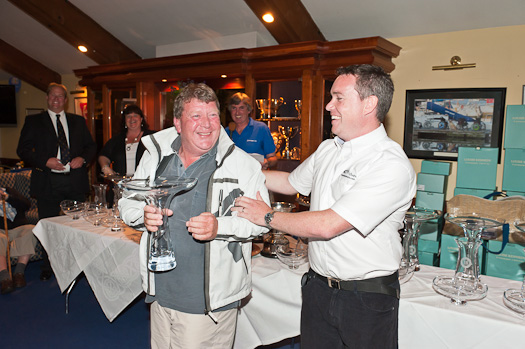
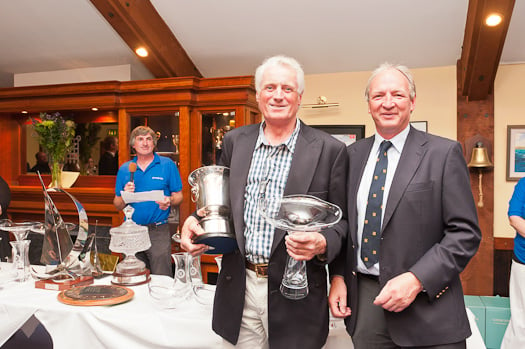
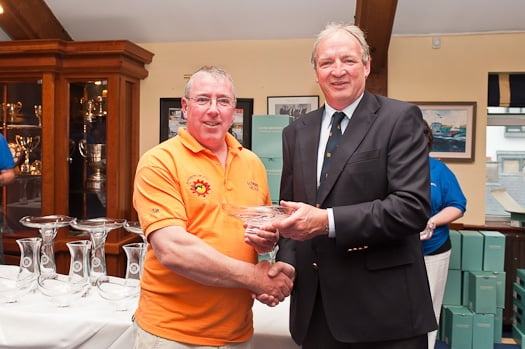
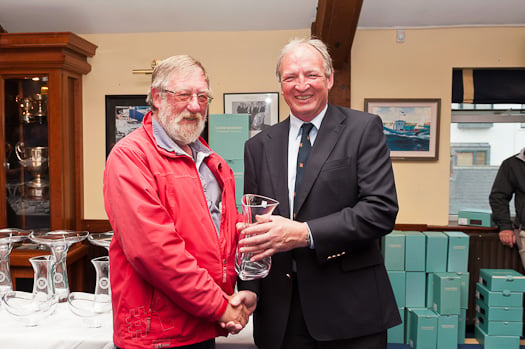
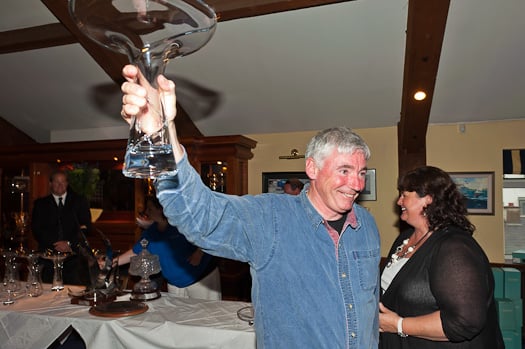
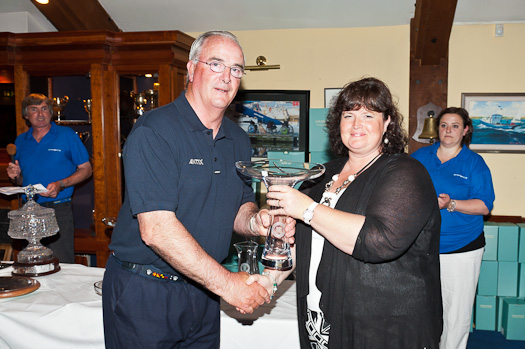
Cruiser Racers Head for Royal Cork
Simon McGibney of WIORA confirmed there are already at least 15 boats interested in travelling to the event to join with the Cork, Kinsale and East coast boats. There is also the tantalising prospect of the fleet being joined by no less than ten quarter tonners from the UK who also plan to sail in the Sovereign's Cup at Kinsale the following week. Most of these British boats are crewed by professionals and will race with the Irish Class three fleet. They will, however, be scored separately and will receive a separate trophy.
Sailing with the Quarter Ton fleet will be Anchor Challenge, beautifully restored and modified by former owner Peter Morton, and now in the ownership of Eamon Rohan. At the weekend our spy spotted an all white gleaming boat wending its way up the Kinsale Road and wondered could this possibly have been Anchor Challenge and, if so, will we see a battle between the all black Tiger and the all white newcomer??
For the duration of the ICRA National Championships there will be subsidised launching at Ringaskiddy for all trailerable boats. In addition a very attractive accommodation package has been arranged for all ICRA competitors at the Carrigaline Court Hotel. They are offering three nights B/B plus one evening dinner from Thursday to Saturday and free B/B for Sunday night at €129 per person sharing.
A crew list has been set up by RCYC for skippers wishing to acquire crews with local knowledge and Race Officers for the event will be the hugely experienced Peter Crowley and Richard Leonard.
ICRA Commodore Barry Rose was delighted to inform the meeting that Yacht Designer Mark Mills has joined the ICRA committee where his expertise and wide knowledge will be greatly appreciated. Mark gave a most interesting report on recent developments re racing matters. One item referred to the fact that boats with bulb keels will now be more severely rated and another item of interest is discussion going on with regard to changing the rating bands for the 2012 Commodores Cup. It is believed there is a move afoot to lower the bands i.e. the current middle rated boat may be the big boat for the 2012 event.
Sovereign's Cup 2005 - Photo Review
Anthony O’Leary’s Corby 35 ‘Antix’ won sailing's Sovereign’s Cup at Kinsale Yacht Club, and Paddy Gregory’s Elan 31 ‘Benola’ the Portcullis Trophy. Eamon Conneely’s Transpac 52 ‘Patches’ was the winner in Division 0 IRC, gaining National Champion title for that Division and the Saab Trophy for IRC.
‘Antix’ was the yacht deemed by the organising committee to have put in the best overall performance under IRC across the four fleets. She and Eamon Crosbie’s ‘Voodoo Chile’ had quite a duelling match in Division 1, with ‘Antix’ emerging as National Champion. ‘Benola’ finished first overall in both IRC and Echo in Division 2, winning double National Championship titles. Neil White’s Sigma 400 ‘Barafundle of Mumbles’ was the Division 1 winner and Champion.
Photos of the 2007 event by Bob Bateman BELOW:



























